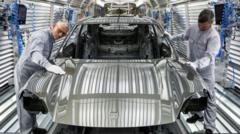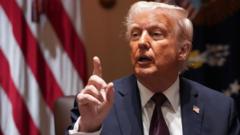As President Trump introduces a significant tariff on imported vehicles, European leaders, including Germany and France, voice strong opposition and call for collective action to counter the economic impact.
Germany Stands Firm Against Trump's Car Tariffs, Advocates for Strong EU Response

Germany Stands Firm Against Trump's Car Tariffs, Advocates for Strong EU Response
Germany asserts its determination to resist US car tariffs, urging a united European response amid global economic concerns.
Germany has firmly stated that it "will not give in" to the newly proposed tariffs on cars and car parts by US President Donald Trump, which impose a 25% tax on automobiles not manufactured in the United States. This move has been met with widespread condemnation across Europe, with leaders calling for a robust response. French President Emmanuel Macron criticized the tariffs as "a waste of time" and "incoherent," while Canadian Prime Minister Mark Carney described them as a "direct attack" on Canada’s automotive industry. Likewise, China has accused the US of breaching international trade regulations.
The imposition of these tariffs is scheduled to begin on April 2, affecting businesses that import vehicles, with additional taxes on parts expected to commence later in May. Analyses suggest that the increase in tariffs could lead to cost surges ranging from $4,000 to $10,000 per vehicle for parts sourced from Canada and Mexico.
During a press conference, German Economy Minister Robert Habeck called for a united front within the European Union, emphasizing the importance of showing resilience against US economic pressure. He stated, “We need to show strength and self-confidence in the face of these tariffs.” Supporting this sentiment, France's finance minister Eric Lombard insisted that Europe should retaliate with tariffs on US goods to create a more balanced trade environment.
In the UK, there is disappointment within the automotive community regarding the announcement, with the SMMT labeling Trump's tariffs as unexpected but disappointing. Business leaders, like Uniparts founder John Neill, have voiced concerns that these tariffs could inadvertently benefit their competitors, particularly China.
Japan has reported that these measures could severely affect their economic relations with the US, describing them as "extremely regrettable." Meanwhile, South Korean car manufacturer Hyundai has announced a $21 billion investment in the US, indicating that even with tariffs, manufacturers are still looking to strengthen their foothold in the American market.
This situation showcases a critical point in international trade relations, with leaders across the globe urging for diplomacy and discussions over potential retaliatory measures to avoid a trade war that could provoke dire economic ramifications worldwide.
The imposition of these tariffs is scheduled to begin on April 2, affecting businesses that import vehicles, with additional taxes on parts expected to commence later in May. Analyses suggest that the increase in tariffs could lead to cost surges ranging from $4,000 to $10,000 per vehicle for parts sourced from Canada and Mexico.
During a press conference, German Economy Minister Robert Habeck called for a united front within the European Union, emphasizing the importance of showing resilience against US economic pressure. He stated, “We need to show strength and self-confidence in the face of these tariffs.” Supporting this sentiment, France's finance minister Eric Lombard insisted that Europe should retaliate with tariffs on US goods to create a more balanced trade environment.
In the UK, there is disappointment within the automotive community regarding the announcement, with the SMMT labeling Trump's tariffs as unexpected but disappointing. Business leaders, like Uniparts founder John Neill, have voiced concerns that these tariffs could inadvertently benefit their competitors, particularly China.
Japan has reported that these measures could severely affect their economic relations with the US, describing them as "extremely regrettable." Meanwhile, South Korean car manufacturer Hyundai has announced a $21 billion investment in the US, indicating that even with tariffs, manufacturers are still looking to strengthen their foothold in the American market.
This situation showcases a critical point in international trade relations, with leaders across the globe urging for diplomacy and discussions over potential retaliatory measures to avoid a trade war that could provoke dire economic ramifications worldwide.





















